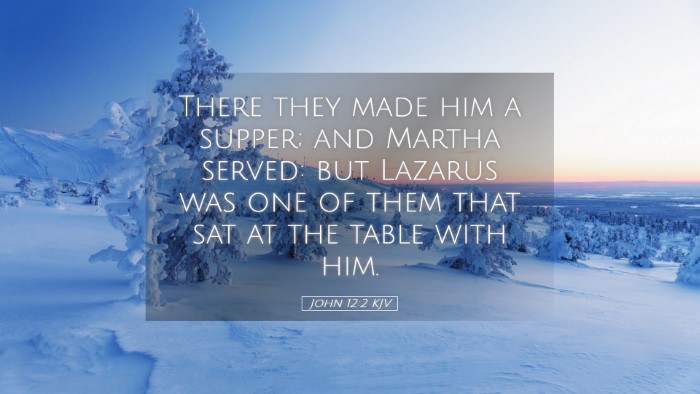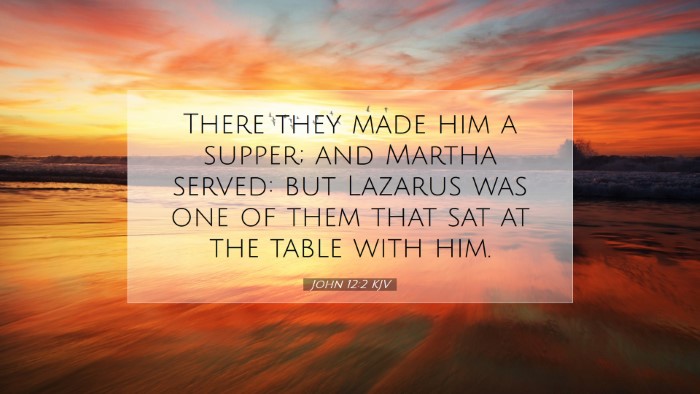Commentary on John 12:2
Verse: John 12:2 - "There they made him a supper; and Martha served: but Lazarus was one of them that sat at the table with him."
Introduction
The context of John 12:2 places us just before the Passover, a significant time when Jesus is nearing the climax of His earthly ministry. This verse features a meal at Bethany, a home that serves as a backdrop to profound relational dynamics and revelatory truths pivotal for understanding Christ's role in humanity's redemption.
Contextual Background
As we explore John 12:2, we observe that Jesus is being honored in the home of Mary, Martha, and Lazarus. The resurrection of Lazarus (John 11) has already created a significant stir, highlighting the power of Christ over death and foreshadowing His own impending death and resurrection. Martha's service in this context can be interpreted in light of the cultural expectations of hospitality in the ancient Near East.
Analysis of the Characters
- Martha: Her role in serving reflects an active faith and dedication to Jesus. As observed in Luke 10:38-42, Martha is characterized by her desire to serve, yet here she is portrayed positively, working in the background as others honor Jesus.
- Lazarus: As a resurrected man, Lazarus symbolizes new life and serves as a powerful witness to the miracles of Jesus. His presence at the table underscores the theme of life emerging from death, an essential element of the Gospel message.
- Jesus: Central to this gathering, His acceptance of the hospitality reflects His human nature while simultaneously foreshadowing His own sacrificial act that is to come. The supper serves as a narrative device that emphasizes both the friendship and the divinity of Christ.
Thematic Insights
Several overarching themes emerge from a careful reading of this passage:
- Communal Fellowship: The supper signifies intimacy and community, reminiscent of the Last Supper and foreshadowing the shared meals of Christian fellowship. It invites reflection on the nature of community in the body of Christ.
- Service to Christ: Martha's actions manifest a living faith that engages in service. This action contrasts with later events where worship, symbolism, and intimacy with Christ grow increasingly evident.
- The Power of Resurrection: Lazarus's position at the table serves as a testament to the victory Christ holds over death. This theme is crucial for Christians as it emphasizes hope and assurance in life and resurrection through Christ.
Commentary Contributions
Various public domain commentators offer insights into this pericope:
- Matthew Henry: He provides a devotional take on the passage, noting the significance of the supper as a moment of recognition and gratitude towards Jesus. Henry highlights Martha's diligence in service while pointing out the joy found in family fellowship—particularly in the presence of Christ.
- Albert Barnes: Barnes emphasizes the implications of the gathering, interpreting it as a recognition of Jesus' authority. He discusses how the act of sharing a meal becomes a means of deepening faith and communal bonds. He further underscores that such gatherings reflect a proper response to Jesus amid trials and miracles.
- Adam Clarke: Clarke’s exegesis focuses on the details of the account, providing cultural context regarding meals and hospitality. He reflects on the purpose behind these meals, a divine appointment where the ordinary becomes sacred through Christ's presence and points out the significance of each character's role amidst the unfolding drama of redemption.
Theological Implications
The act of dining with Jesus is emblematic of the fellowship believers experience with the Savior. This gathering serves as a prelude to the deeper spiritual truths revealed in the Passion narrative. The implications for theology are significant:
- Incarnation: Jesus’ participation in human meals fortifies the understanding of His incarnation—He enters into human experience fully, providing a model for believers on the importance of community and service among each other.
- Passion Prediction: Here we find a setup to the altercations that will soon follow. The very setting of this meal foreshadows tension between belief and disbelief surrounding Jesus’ authority.
- Resurrection Hope: In acknowledging Lazarus at the table, we find a lived hope. For Christians, it validates the promise of eternal life—a constant theme throughout John's writings.
Conclusion
John 12:2, though nestled in the narrative of Jesus' final days, presents rich layers of meaning through its simple depiction of a meal shared among friends. It calls believers towards deeper acts of service, faith, and remembrance of the resurrection. For pastors, students, theologians, and scholars, this passage serves not only as a historical account but as an invitation to contemplate the intimate relationship believers are called to develop with Christ, finding in Him the life and sustenance needed for spiritual journeying. The communal aspect of faith is illuminated, offering a model worthy of emulation in contemporary Christian fellowship.


